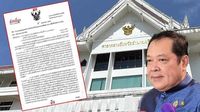In a move that has sparked significant public outcry, the Thai Parliament, known as the "Sappaya-Sapasathan," is facing scrutiny just five years after its completion. The government is seeking additional funding for 15 new projects, amounting to a staggering 2.773 billion baht, raising questions about the necessity and efficiency of the new parliamentary building located on the banks of the Chao Phraya River.
Originally constructed at a cost of 1.5 hundred million baht, the parliament has been marred by a series of controversies since its inception. The construction process, which began over a decade ago, has been plagued by delays and design modifications, with the project extending over 11 years and undergoing four significant design revisions. The first pile was laid on May 8, 2013, and the building was finally completed in 2024, with inspections confirming that the construction was 100% finished.
However, despite the completion, the parliament has not been free from issues. A notable incident occurred on May 17, 2024, when a floor collapse raised alarms about the building's structural integrity. These ongoing concerns have prompted the Secretariat of the Senate to express apprehensions regarding the building's safety and functionality.
In an unexpected twist, rather than receiving compensation for construction delays from the contractor, Sino-Thai Engineering and Construction, the parliament found itself embroiled in a lawsuit. The Office of the Secretary-General of the House of Representatives was sued for 1.59 billion baht by the contractor, claiming that the parliament's failure to timely hand over construction areas caused the delays.
On September 17, 2024, the Central Administrative Court ruled in favor of the parliament, stating that the contractor could not claim damages due to the clear stipulations in the contract regarding the delays in site handover. The ruling emphasized that both parties were aware of the potential issues surrounding the construction timeline.
As the parliament prepares to request an additional budget for new projects, public skepticism is growing. Critics are questioning the need for further expenditures on a building that has already cost over 20 billion baht to construct. The proposed 15 projects, which include enhancements and additional facilities, have ignited debates about their necessity in light of the building's already substantial budget.
Further complicating matters, the parliament's new projects are being scrutinized by the National Anti-Corruption Commission (NACC), which is currently reviewing numerous complaints related to the parliament's construction process. During the tenure of Padiphat Santiprada, who was the first deputy speaker of the House of Representatives, an independent committee was established to investigate various issues concerning the building's integrity.
Former chairman of the NACC, Wilas Janpitak, has voiced concerns that the issues surrounding the new parliament are merely the tip of the iceberg. He suggested that many unresolved matters remain, which have yet to be addressed by the committee overseeing the project.
In light of these developments, Apat Sukhanan, the current Secretary-General of the House of Representatives, confirmed that the parliament was inspected and approved as fully operational on July 4, 2024. However, questions linger about whether the ongoing controversies are being suppressed or overlooked.
As Thailand's political landscape continues to evolve, the parliament's request for additional funding amidst ongoing scrutiny could set a precedent for future governance and accountability. The public's trust in the parliamentary system hinges on transparency and the responsible use of taxpayer funds, especially in light of the significant investments already made in the new building.
Meanwhile, the ongoing investigation into the alleged corruption surrounding the selection of senators has added another layer of complexity to the political scene. The Election Commission (EC) is reportedly preparing to file charges against several senators for their involvement in a scheme to manipulate the election process. This scandal has drawn attention to the integrity of the electoral system and the need for reform.
In March 2025, the Special Case Committee (SCC) began investigating allegations of money laundering and racketeering related to the 2024 senator elections. The EC has established a separate committee to gather evidence and conduct inquiries into the alleged collusion. This investigation has already seen over 30 witnesses interviewed, with a focus on financial transactions exceeding 500 million baht.
The political fallout from these investigations could be significant, with potential implications for the future of the senators involved. The EC is expected to take action against those found guilty of misconduct, which may include disqualifying them from holding office.
As the political climate becomes increasingly contentious, the relationship between the Ministry of the Interior and the Ministry of Justice is being tested. On May 5, 2025, a report emerged detailing a covert operation by individuals claiming to be from the Department of Special Investigation (DSI) who allegedly intimidated a former senator candidate into confessing to electoral fraud. The DSI quickly clarified that their agents were acting within the law and denied any coercion.
This incident has raised questions about the integrity of the investigation process and whether political pressures are influencing the outcomes. The Justice Minister, Taveesak Sodsong, emphasized the importance of cooperation during investigations, warning that non-compliance could lead to severe penalties.
As these scandals unfold, the question remains: will the Thai political system emerge stronger from these challenges, or will it continue to be mired in controversy and distrust? The coming months will be crucial in determining the future trajectory of both the parliament and the electoral process in Thailand.

